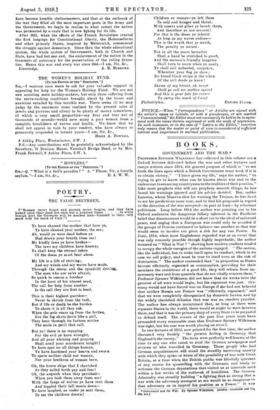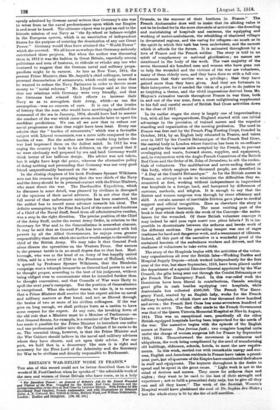BOOKS.
GOVERNMENT AND THE WAR.*
PROFESSOR SPENSER WILKINSON has collected in this volume son s Oxford lectures delivered before the war and other lectures and essays written since 1914, the general purpose of which is " to set forth the lines upon which a British Government must work if it is
to obtain victory." " I have given my life," says the author, " to trying to get to know what can be known about war and to the endeavour to arouse my countrymen to the realities of their position." Like most prophets who will not prophesy smooth things, he has found his warnings ignored and his advice derided. But, unlike Laocoon, whom Minerva slew for warning the Trojans, he has lived to see his predictions come true, and to find his proposals in regard to the direction of the war accepted—in part at least—by reluctant politicians. Long before 1914 the author was pointing out to his Oxford audiences the dangerous fallacy inherent in the Pacificist belief that disarmament would be a short cut to the ideal of universal peace, and urging that a European war could only be avoided if the groups of Powers continued to balance one another so that war would seem to involve too great a risk for any one Power. In June, 1914, when most Englishmen regarded war as an event that was only remotely possible though highly improbable, the author lectured on " What is War 1 " showing how modem conflicts tended to occupy the whole energies of the nations engaged. " The nation, like the individual, has to stake itself upon its conduct, which in its case we call policy, and must be true to itself even at the risk of destruction." The author contended that " in proportion as States become efficiently organized as communities, providing for their
members the conditions of a good life, they will refrain from un-
necessary wars and from quarrels that do not vitally concern them." Professor Spenser Wilkinson did not know that six weeks later the greatest of all wars would begin, but his argument was just. Ger- many would not have forced war on Europe if she had not believed that neither Russia nor France was " efficiently organized," and that we were completely disorganized by domestic faction and by the widely cherished delusion that war was an obsolete practice. The author has always maintained that, so long as there were separate States in the world, there would or might be wars between them, and that it was the primary duty of every State to be prepared to defend itself. The events of the past four years must have persuaded every reasonable man that Professor Spenser Wilkinson was right, but his case was worth placing on recori.
In two lectures of 1912, now printed for the first time, the author discussed very frankly " the present feeling in Germany that England is the enemy." The facts were perfectly well known at the time to any one who cared to read the German newspapers and reviews or who travelled in Germany. Those people who had
German acquaintances will recall the steadily increasing anxiety with which they spoke or wrote of the possibility of war with Great Britain, at a time when the British public was blissfully ignorant of any reason for quarrelling with the Germans, and ready to welcome the German deputations that visited us at intervals until within a few weeks of the outbreak of hostilities. The German Admiralty was steadily building " a fighting fleet so strong that a war with the adversary strongest at sea would be so dangerous to that adversary as to imperil his position as a Power." It was • Government and the War. By Spenser Wilkinson. London: constable and Co, [de. att.' openly admitted by German naval writers that Germany's aim was to wrest from us the naval predominance upon which our Empire is and must be based. The ultimate object was to put an end to the historic mission of our Navy as "the fly-wheel or balance-weight in the European system, which is an association of independent States for the purpose of resisting the domination of any one Great Power." Germany would thus have attained the " World-Power" which she coveted. We all know nowadays that Germany seriously entertained these projects. But when the author was discussing them in 1912 it was the fashion in Great Britain, especially among politicians and men of business, to ridicule or rebuke any one who ventured to suggest that the German naval and military propa- gandists might be in earnest. As late as New Year, 1914, the present Prime Minister, then Mr. Asquith's chief colleague, issued a personal denunciation of armaments, which could only mean that he wanted to reduce the Navy Estimates in order to devote more money to " social reforms." Mr. Lloyd George said at the time that our relations with Germany were very friendly, and that the Germans had relaxed their efforts to increase their Navy so as to strengthen their Army, which— so ran the assumption—was no concern of ours. It is one of the ironies of history that the man who would have unwittingly sacrificed the command of the sea in January, 1914, should have had to assume the conduct• of the war which came seven months later to upset his confident predictions. We can all see now that to reduce our naval programme at that time might have been fatal. Every one admits that the " burden of armaments," which was a favourite suLject with Liberal economists, was a mere trifle compared to the burden of war. But the author saw these truths long before the war had impressed them on the dullest mind. In 1912 he was urging the country to look to its defences, on the ground that if we were obviously well prepared by sea and land Germany would think better of her bellicose design. His advice was not taken, but it might have kept the peace, whereas the alternative policy of doing nothing and pretending that Germany was our very good friend unquestionably hastened on the war.
In the closing chapters of his book Professor Spenser Wilkinson sets out his reasons for proposing that the war chiefs of the Navy and the Army should be in personal contact with the Prime Minister, who must direct the war. The Dardanelles Expedition, which he discusses in some detail, was planned by civilians in disregard of the opinions of their naval advisers. It is not clear that the full moral of that unfortunate enterprise has been mastered, but the author has to record some advance towards his ideal. The definite assumption by the First Sea Lord of the name and functions of a Chief of the Naval Staff, freed from all administrative routine, was a step in the right direction. The precise position of the Chief of the Army Staff, under the recent Army Order, in relation to the Secretary for War and to the Generalissimo is somewhat obscure. It may be said that as General Foch has been entrusted with full powers by all the Allied Governments, he enjoys even greater responsibility than that which the author would assign to the military chief of the British Army. We may take it that General Foch alone directs the operations on the Western Front. Our success in the present battle is in no small degree due to that fact. Marl- borough, who was at the head of an Army of less happily united Allies, said in a letter of 1705 to the Pensioner of Holland, which is quoted by Professor Spenser Wilkinson, that the Blenheim campaign was a triumph because he as General had power to act as he thought proper, according to the beet of his judgment, without being obliged ever to communicate what he intended further than he thought convenient, and that Councils of War were likely to spoil the next year's campaign. But the position of Generalissimo is exceptional. What the author wants, we take it, is to ensure that a Prime Minister shall receive the best expert advice on naval and military matters at first hand, and not as filtered through the brains of two or more of his civilian colleagues. If the war goes on long enough, we shall perhaps learn as a nation to have some respect for the expert. At any rate, the breaking down of the old rule that a Minister must be a Member of Parliament—so that General Smuts, for example, is a member of the War Cabinet— has made it possible for the Prime Minister to introduce one sailor and one professional soldier into the War Cabinet if he cares to do so. The essential thing, however, is that the Prime Minister and the War Cabinet should believe in the naval and military advisers whom they have chosen, and act upon their advice. For our part, we hold that in a democracy like ours it is right and necessary for the First Lord of the Admiralty and the Secretary for War to be civilians and directly responsible to Parliament.



























 Previous page
Previous page